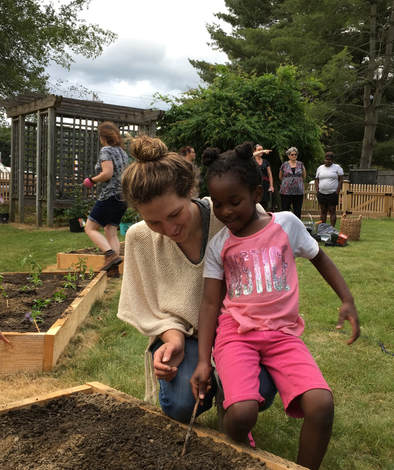Gardening and Nutrition
"To plant a garden is to believe in tomorrow." -Audrey Hepburn
Participants in R.E.A.C.H. cultivate both flower and vegetable gardens during the twenty weeks of workshops with no experience required. The garden area is accessible to all abilities and open to participants, families, and mentors at any time.

Low-income women and their children also face what is known as food insecurity. Because time and money are in short supply, there is pressure to buy foods that are cheap and easy to prepare. Families facing food insecurity may not be currently starving, but many are malnourished due to a diet high in carbohydrates and trans-fats. Food insecurity can have serious health consequences for children such as vitamin deficiencies, and has been linked to higher rates of learning disabilities and poor school performance. Children in low- income families have poorer literacy readiness than children from higher income families. Research consistently demonstrates that the literacy readiness of a child is positively linked to the educational attainment, and relatedly the income capacity, of their parents, specifically their mother.
The R.E.A.C.H. program addresses some of the effects of food insecurity that participants and their children may be experiencing by producing fresh vegetables available to participants at no cost. The health and nutritional components of the R.E.A.C.H program’s curriculum also includes vegetable growing, preparation and preserving techniques.
There is a children’s garden as well as several other beds of vegetables, herbs and flowers. Many classes involve being in the garden area and mentors have the option of meeting with mentees in the gardens during their weekly check-ins.
The R.E.A.C.H. program also utilizes the garden as an opportunity to expand participants’ skill set and earning capacity as gardening and knowledge of food preparation is a highly marketable skill in the Berkshires.
The R.E.A.C.H. program also uses the garden to reinforce classes on self-care and mindfulness. The garden provides a space in nature where women can move beyond their individual traumas by learning about plants and themselves. Nature heals, growing food empowers, and caring for plants offers an opportunity for peaceful communion between mind, body and earth.
The R.E.A.C.H. program addresses some of the effects of food insecurity that participants and their children may be experiencing by producing fresh vegetables available to participants at no cost. The health and nutritional components of the R.E.A.C.H program’s curriculum also includes vegetable growing, preparation and preserving techniques.
There is a children’s garden as well as several other beds of vegetables, herbs and flowers. Many classes involve being in the garden area and mentors have the option of meeting with mentees in the gardens during their weekly check-ins.
The R.E.A.C.H. program also utilizes the garden as an opportunity to expand participants’ skill set and earning capacity as gardening and knowledge of food preparation is a highly marketable skill in the Berkshires.
The R.E.A.C.H. program also uses the garden to reinforce classes on self-care and mindfulness. The garden provides a space in nature where women can move beyond their individual traumas by learning about plants and themselves. Nature heals, growing food empowers, and caring for plants offers an opportunity for peaceful communion between mind, body and earth.
Sisters for Peace
413-205-6442
413-205-6442